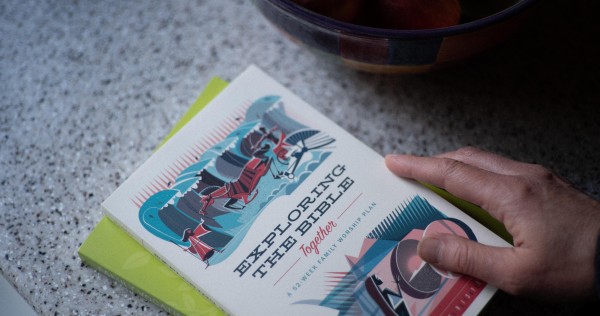Our children are being discipled. The only question is, who’s discipling them? You or the world?
To disciple someone is to teach them by word and example so that they model their lives upon the teacher. The world is, therefore, filled with disciple-makers. Whether they’re Instagram influencers or reality TV stars, branded sports stars or college professors, supermodels or celebrities, they are all teaching their followers and fans by word and example in order to shape them like themselves (and possibly make themselves a few dollars, too).
Every day, millions of these disciple-makers all over the world wake up thinking about how to disciple our children. They use every resource at their disposal to persuade our kids to follow them, their values, and their ways of life. As a result, many of our children are embracing worldly values, following the world’s example, and heading to the world’s disastrous end.
Can we stop this? Can we change this for the better? Yes and yes. Though it is hard work, it is possible, and I want to give you two powerful motivations to encourage you.
WE HAVE POWERFUL MOTIVATIONS TO DISCIPLE OUR CHILDREN
If we are to counteract the world’s disciplers, it’s not enough to simply stop our children from being exposed to worldly influences. (We’ll never totally succeed in that anyway.) We have to put positive influences into their lives that will push back against the world’s influence and replace it with something better. In other words, we have to be better disciplers than the influencers—more engaged, more proactive, and more deliberate. To underline this, Jesus doesn’t leave our discipleship of our children as an optional extra but rather issues a command.
Jesus commands us
Among Christ’s last words to his disciples was this command: “Go home, therefore, and make disciples of your children.” Wait, that’s not the way the Bible puts it. Instead he says, “Go, therefore, and make disciples of all nations” (Matt. 28:19).
“There’s no point in traveling the world to disciple the nations
if we neglect our own children under our own roofs.”
Yes, the second version is the way the Bible puts it. But going into all the world includes going into our homes. Making disciples of the nations includes making disciples of our children. The big picture includes the smaller picture. If we are commanded to go and disciple the nations, we can surely assume that we are to disciple our own children. We’re not to stop there, but we are to start there. There’s no point in traveling the world to disciple the nations if we neglect our own children under our own roofs.
Our children are therefore our first priority. Our supreme ambition must be that our children become disciples of Christ. A disciple of Christ is someone who studies Christ through his Word with a view to trust, follow, serve, and imitate him better. That’s why God put our children on this planet. That’s the reason for their existence.
Jesus comforts us
When we begin to think about discipling our children, and especially when we actually begin doing it, we soon think, “Can I do this? It’s so daunting. It’s so hard. I can’t keep it up. The kids don’t want to learn about or follow Jesus. I’ve started too late. The world’s influences are so strong. Is there any point in trying?”
Jesus hears our fears, senses our discouragement, and sympathizes with our inabilities. That’s why he follows his command with a word of comfort: “And behold, I am with you always, to the end of the age” (Matt. 28:20). That comforting promise carried David Livingstone to the tribes in Africa; will it not carry you to the children in your living room? He promises to be with us as we disciple our children. Is that not a great encouragement to obey the command?
“I’m persuaded,” you might say. “I hear Christ’s clear command and receive Christ’s enormous encouragement. I’m motivated. But what do I do? How can I disciple my children?” Let’s look at a simple method of discipling.
WE HAVE A GOOD METHOD TO DISCIPLE OUR CHILDREN
The details of discipleship depend on the ages and stages of our kids, but I want to give you a simple and memorable method in the form of a mission statement that you can implement in different ways. Here it is: We are in the Word to worship, walk, work, and witness in weakness. Let’s break this down a bit.
We: Discipleship is done in relationship. Jesus spent face-to-face time with his disciples. They were friends. They did life together. The same goes for discipling our children. It is done in relationship. We must spend face-to-face time with them. Whatever we try to teach or model for them will have little or no impact if it’s not built upon the foundation of relationship. Everything that follows below, therefore, has a big “we” written over it. We are in the Word together, we worship together, we walk together, and so on.
“Whatever we try to teach or model for them will have little or no impact
if it’s not built upon the foundation of relationship.”
Word: This relationship is Bible-focused. We are in the Word. We read the Bible together, talk about the Bible together, memorize the Bible together, study the Bible together. We provide resources to help our children read the Bible on their own (e.g. Meeting with Jesus or Exploring the Bible), and we discuss their readings with them regularly. Questions could be, “What did you read today? What did you learn about Christ today? Do you have any questions about what you’re reading?” And in those discussions, share your own Bible reading discoveries with them, too.
Worship: We are in the Word to worship. The aim of being in the Word is to bring our children into a worshipful relationship with God. The Word is not the end, it’s the means to an end—adoring fellowship with God. We therefore model private worship, we involve our children in family worship (see Exploring the Bible Together), and we participate in public worship in our churches. We encourage them to see all of life as an opportunity to worship God. We play worship songs in our cars and in our kitchens. We sing together to God as families. Let your children see that worship is the high point of your week and the greatest joy in your life.
Walk: We are in the Word, not only to worship, but to walk. Discipling someone starts with a vertical relationship with God, but it moves on to the horizontal. We worship God with a view to walk with God in this world. Walking with God in the world means going forward in holiness, Christlikeness, and usefulness. It means honoring God in our daily lives by obeying him and living to please him, especially in our relationships with the others we walk alongside.
“We worship God with a view to walk with God in this world.”
Work: We are in the Word to work. Whether we work at home or in an office, in a factory, or in the yard, work is where we spend most of our waking hours and is therefore the primary sphere in which we honor God. We carry the Word, our worship, and our walk into our workplaces. We disciple our children by giving them a good example of how to work and involving them in our work in the home or in the yard. We also show our children that we are zealous to serve God in our church. We want our children to view their daily jobs and their church service as part of the good works with which they glorify God.
Witness: We are in the Word to witness. Part of discipling is training our children to make disciples of others. We can teach them evangelism and apologetics and encourage them to go on mission trips or to speak to their friends about the Gospel. But most of all, they learn from our own witnessing to them and to others we meet in everyday life.
Weakness: We do all this—in the Word to worship, walk, work, and witness—in weakness. We must constantly remind our children of our own weakness and of their weakness—reminding them that we need God’s mighty and gracious power to save, sanctify, and equip us. We teach our children that without God, they and we can do nothing. We also encourage them that through Christ we can do all things. Whatever else they learn from us, let them get an A+ in this: it is by grace alone, through faith alone, in Christ alone that they can be a disciple of Christ. Constant reminders of our weakness and Christ’s strength will strengthen our children and weaken the world.
For more on discipling your kids, see The Disciple-Making Parent: A Comprehensive Guidebook for Raising Your Children to Love and Follow Jesus Christ.





